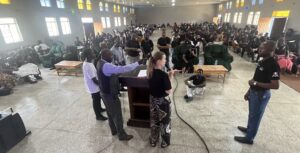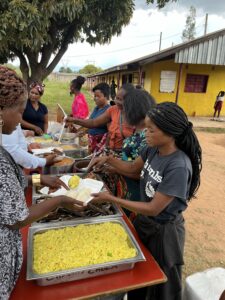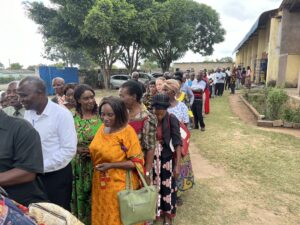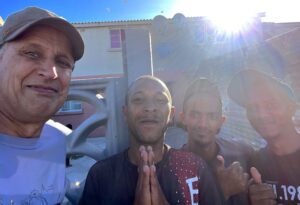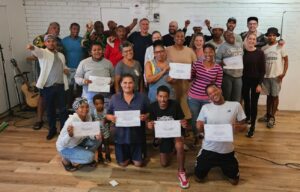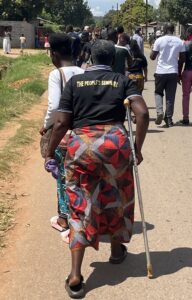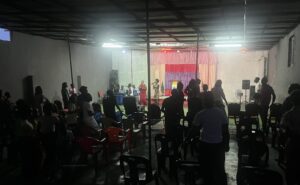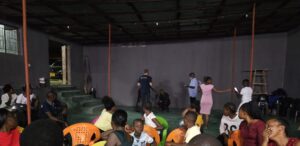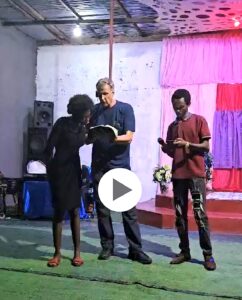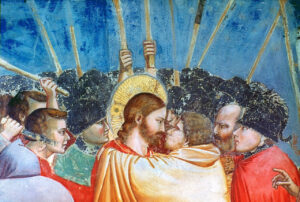 Jesus’ encounter with Judas and his healing of the Jewish High Priest’s servant at his arrest offer a life-giving alternative to the warring factions in the Middle East, Christian supporters of the State of Israel now, and partisan hatred as the US moves towards its presidential election.
Jesus’ encounter with Judas and his healing of the Jewish High Priest’s servant at his arrest offer a life-giving alternative to the warring factions in the Middle East, Christian supporters of the State of Israel now, and partisan hatred as the US moves towards its presidential election.
Israel’s retaliatory strikes against Hamas, Hezbollah and the Houthis, and soon Iran, couldn’t contrast more with Jesus’ self-giving love– which we expect since the majority of Israelis do not believe Jesus is their Messiah. Yet Jesus calls this way of violence “the authority of darkness.” He did not justify violence, but effected a surgical strike to destroy it’s authority through his crucifixion, modeling to us his followers the only effective retaliation– self-giving love.
Nowhere in the Gospels do we see Jesus physically defending himself against persecutors, or justifying violence in defense of Israel or his followers! No wonder he was rejected then and now– but not by everyone!
Jesus confronted two of his disciples at the moment of his arrest– Judas his betrayer and Peter, his defender. He named Judas’ action of betrayal, while allowing himself to be kissed and handed over. His last miracle was to heal the ear of the High Priest’s servant, reversing Peter’s attempt to protect him, before ordering Peter to put away his sword.
It is time for those who claim to follow Jesus as Israel’s Messiah (Christ) and the world’s Savior to break with the authority of darkness, and choose to align with his radical authority of light.
Philemon of Gaza brilliantly expresses this in his following commentary of Luke 22:47-53, available here.
“Not all kisses are false, but Judas’s was; it is more precisely hypocritical because it hid something else behind the apparent love. A true kiss expresses only love from the heart (Song 1:2)18 but Judas’ kiss contained betrayal, as Jesus showed him, telling him what he saw in his heart: “With a kiss you betray me.” Jesus was not content with unmasking Judas’ hypocrisy; he did so while showing him true love through the words he spoke to him. Jesus, in fact, addressed the traitor by name, “Judas,” and referred to himself as “the Son of Man.” Judas could hardly forget that Jesus had done the same with Zaccheus, addressing him by name (19:3) and speaking of himself as the Son of Man (19:10); this was the way he spoke when he came to find in Zaccheus a lost sheep. And this is what Jesus was doing here: he was looking for his lost sheep named Judas. What love and what mercy towards Judas, who thereby discovered the extent of the love with which he was loved. O my soul, Judas came to betray Jesus, and Jesus came to save Judas! One embraced with hypocrisy, and the other embraced with indescribable love, divine love, which over- flowed with infinite mercy.
The infinite love of Jesus is manifested again here, not only by a kiss, but by an extraordinary miracle. Jesus, in fact, healed the ear of the high priest’s servant. This is truly extraordinary because this is perhaps the first time that Jesus performed a miracle for someone who did not believe in him. We could even say that, on the contrary, the servant considered Jesus a bandit, to use Jesus’ own word. The servant came to arrest, not the Son of Man, but a bandit who was pretending to be the Son of Man. During the arrest, someone close to Jesus cut off the man’s ear, but there is no indication that he turned to Jesus asking for healing. The man did not expect a miracle, and yet Jesus healed him, without saying anything, with infinite love, divine love. What inexpressible compassion for this man, who now suddenly discovered the love with which he was loved! O my soul, this servant came to arrest Jesus, and Jesus came to save him. No doubt he converted, because his name, Malchus, is cited elsewhere (Jn 18:10), suggesting that he must have been part of the first Christian community.
An astonishing contrast appears here, as revealed by Jesus at the end of this passage, the contrast between the authority of the Son of Man and the authority of darkness. Judas had fallen under the authority of darkness, under the authority of the prince of darkness, the authority of the Liar who, one day, even dared to propose to Jesus that he give him this authority (Lk 4:6). Judas submitted to the authority of darkness and became a man of darkness. In contrast to this authority, we see here the Son of Man, who received all authority from God and who manifested his authority in a miracle for another man of darkness, a miracle done with an authority greater than that of the Evil One. Jesus’ divine authority is the authority of love, not of lies or the sword. Jesus calls on his people to sheathe the sword, which only wounds, because love is stronger than everything and heals what the sword has wounded. The love of Jesus is so great that it touches even the heart of an enemy. This is the first time that Jesus had performed a miracle for an enemy. In this way, he here teaches us love of enemies. He teaches it by practicing it himself. He performed this miracle at the very moment the disciples fled (Mt 26:56). They would carry away in their hearts this unforgettable example of deep love as they went.
O my soul, it is the hour of darkness, Jesus tells us here, the hour when darkness begins to settle in and will thicken until it covers the whole earth at the time of the cross (Lk 23:44). But, in this darkness, the Son of Man already shines with the glory with which he will shine on the day he returns. Jesus is here, a man of light among the men of darkness; he is here, the light of the world (Jn 8:2), which shines before our eyes and which we can contemplate; here he is, his heart filled with love for a lost sheep that he does not want to abandon, his heart filled with love for a servant of whom he makes himself a servant by healing his ear cut off by a sword. He is present wordlessly, without a weapon, facing those who come to arrest him with swords and staves. He is present, overflowing with a love that eclipses the hypocritical love of a kiss. He is present before us with a love so great that there are no words to describe it. O my soul, let us prostrate ourselves before him and contemplate him.
You are blessed, Lord Jesus, you, the light of the world who shine here with all the brightness of your love . . .”
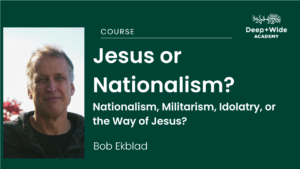 The danger of so-called “Christian Nationalism” is real– and especially now! This course below explains what it is, and how the way of Jesus is radically different. Deep and Wide Academy is hosting this new course, which offers:
The danger of so-called “Christian Nationalism” is real– and especially now! This course below explains what it is, and how the way of Jesus is radically different. Deep and Wide Academy is hosting this new course, which offers:
- Challenges to unexamined assumptions about Nationalism, Militarism, and Idolatry
- An understanding of the current political climate in the context of these idolatries
- Counsel on how to live in an alternative, Jesus-centered community and mission
Sign up for this online video course here. Use the coupon code JESUSORNATIONALISM until November 6 for a 50% reduction in course fee of $29.99.
In addition: The People’s Seminary is offering our annual Zoom “Certificate in Holistic Liberation” (Module 1), beginning October 8, and continuing for 12 Tuesdays, 10:30am-12:00pm (PST). If you are unable to attend the live sessions, we are offering a special course which will be uploaded for you to go through at your own pace and on your own schedule. For more information or to sign up, click here.
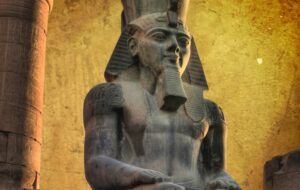
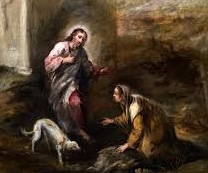
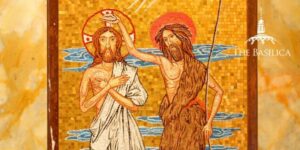
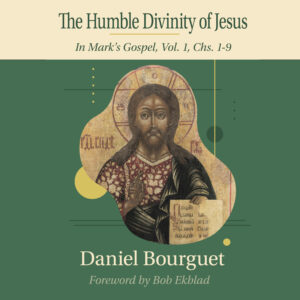
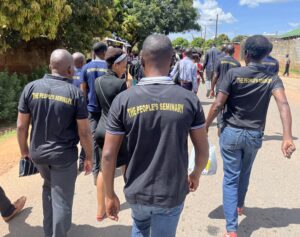
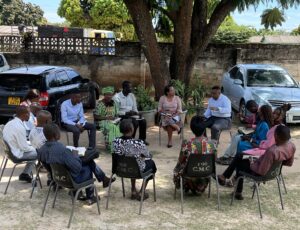
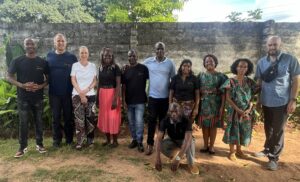 Already, my brother Andy has offered numerous CTMMs in Kenya and Uganda together with a team of African trainers through his Beautiful Gate Ministries.
Already, my brother Andy has offered numerous CTMMs in Kenya and Uganda together with a team of African trainers through his Beautiful Gate Ministries.